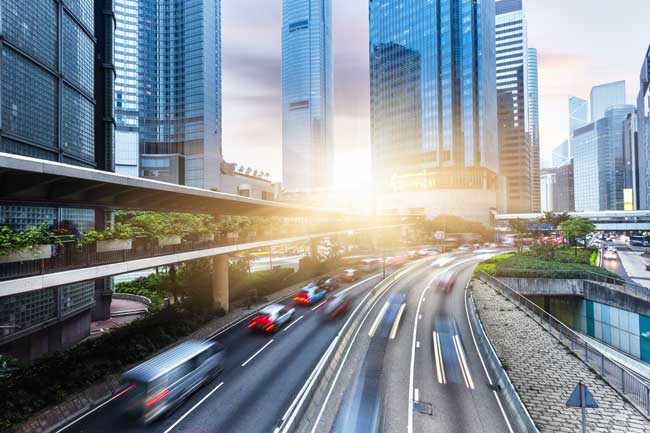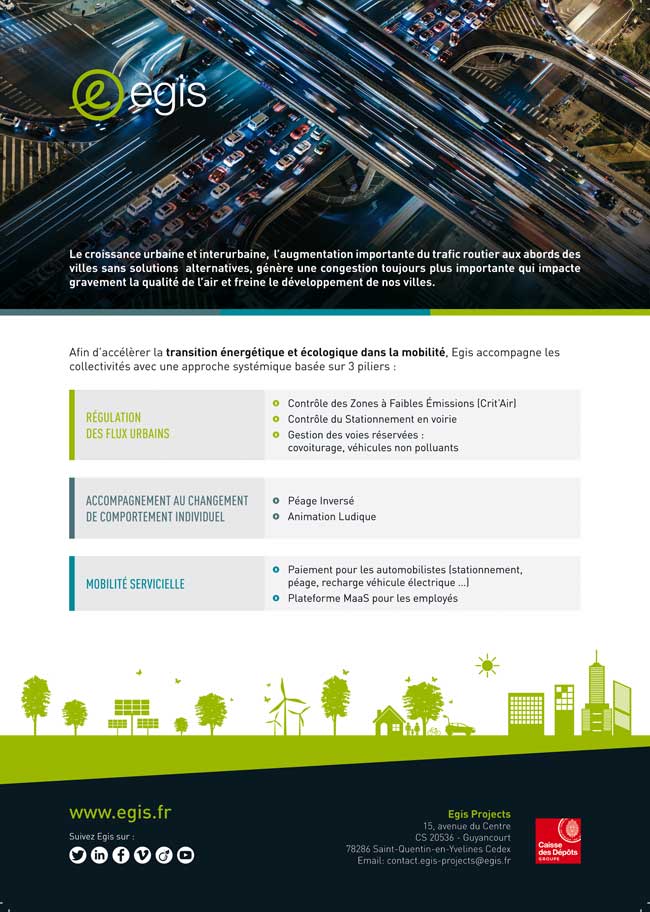
Everyone knows about Egis but today we know there are new challenges. What is Egis’s policy on sustainable development and in particular in areas related to mobility?
The Egis Group’s mission is to support communities in the context of ecological and energy transition towards new mobility practices that are less polluting and more virtuous, and this during all phases of a project: from initial considerations and strategic planning to design, implementation and operation.
We are inventing, in a close-cooperation with communities, the solutions of tomorrow’s smart cities, but Egis already offers innovative and operational services to solve urban and peri-urban congestion, to optimize the use of existing infrastructures and to improve the quality of the air. To that end, we develop approaches and solutions based on the latest technological innovations and we also innovate with regard to economic and social components.
At Egis, we carry out more than 60% of our business internationally and we have an ease of promoting an exchange of best practices between cities in Europe and around the world in the field of sustainable mobility. This is particularly the case for cities like Amsterdam and Rotterdam, which pioneered reverse-tollbooths and smart parking, and inspired other cities to move towards these initiatives.
Between “control and increased mobility” what is the right balance for the comfort of citizens?
Tomorrow’s world of mobility, with autonomous cars and the so-called “enhanced” infrastructure, also brings about important changes in uses that will affect the daily lives of citizens. Some will be done in a natural way, and others will need more support from politicians. For this, the two components, that of regulation through effective control and accompanying change through individual gratification (Nudge theory) must be integrated into a single urban policy.
What is the origin of the Inverted-tollbooth project?
This project effectively relieves congestion in main access roads and highways up to 5-10% at peak time. These have already proved their worth, particularly in the Netherlands, and are increasingly of interest to French communities… To this end, users are encouraged to adopt more virtuous behaviour with regard to their mobility, by setting up educational and incentive measures that encourage them to practice more positive mobility. The principle is simple: unlike a congestion charge that penalizes drivers, we reward them temporarily if they do not take their car during peak hours. We talk about “Nudge”, the push to change habits. Indeed, without this incentive, nobody would make the effort of reorganizing their private life to get around. With our method, it’s a winning combination for all involved and it works! Our experience in the Netherlands confirms this. After the cessation of the reward, more than 80% of the participants kept up their good habits (getting around in staggered hours, telecommuting, carpooling, use of public transport…). A person who already has a virtuous behaviour, who takes public transport for example, does not need to change their good habits.

Egis is very aware of air quality as a public health issue. How to guarantee and make low emission zones more reliable?
Control is an indispensable lever for successfully setting up low emission zones. It can be manual or automated. The latter ensures the equal treatment of motorists and represents a significant productivity gain for communities, on the condition of a long-term project. Feedback from European cities, especially from Amsterdam, shows that the control efficiency rate goes from 66% with manual control to 97% with automatic control.
In order to optimize the cost of its operation, the ZFE control can be combined with other control systems deployed in the urban area: hazardous material transport, public safety, on-street parking. The latter has high potential and numerous ways in which it could be optimized. Several cities are adopting automated control for on-street parking.
EGIS
15 avenue du Centre
78280 Guyancourt, France
https://www.egis.fr



















